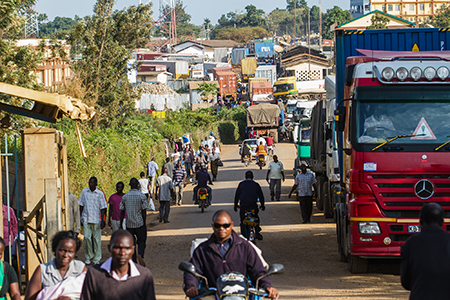
Our Projects are
Transforming African Trade
Quick Contacts
2nd Floor, Fidelity Insurance Centre Waiyaki Way, Westlands
Six Netherlands Ambassadors based in the EAC countries and the DRC visited the Uganda Revenue Authority (URA), on Thursday 15 January. The main objective of the visit that was organized by TradeMark Africa was to assess the customs reforms at the URA for Uganda and the region, a program that is supported by the Government of Uganda and several Development Partners, including the World Bank and the Governments of Sweden, Denmark, United Kingdomand the Netherlands. During the URA visit the Ambassadors interacted with several companies including DHL, SolarNow SEKO Logistics, Nice House of Plastics, Unifreight and Rapid Kate.

The Ambassadors understood that the new electronic tracking of cargo trucks had led to the complete elimination of physical escorts, improved the security of goods in transit, improved staff performance and reduced transit time from 8days to 2days resulting in cost savings of US$400-600 per truck per day. Between 9th May and 6th August 2014, over 4214 consignments used ECTS, resulting in savings of almost US$ 548,000 in escort fees.
The Ambassadors appreciated that the new ASYCUDA World computer system has enabled URA to operationalize the implementation of the Single Customs Territory (SCT) by eliminating the need of multiple declarations to just two, at the point of entry in the EAC and at final destination. URA has also seen an increase inrevenue collections by 16% from 2013 to 2014 and an increase of 18% in fuel volumes for period February to July 2014.
Furthermore, the Ambassadors were informed that 22 Ugandan companies with the highest levels of compliance have been accredited with the Authorised Economic Operator (AEO) status where all customs declarations related to an AEO are given priority clearance, a kind of red-carpet approach, when passing the borders, thereby saving time and costs. Some of the AEO companies that also attended the visit at URA include DHL, Rapid Kate and Nice House of Plastics.
The Netherlands Ambassador to Uganda, Alphons Hennekens said: “We support the customs reforms at URA because it facilitates regional trade. Improved regional trade will accelerate the transformation of Ugandan agriculture which is a core element of Uganda’s Vision 2040. As such regional integration contributes to poverty reduction and is an incentive for attracting Dutch investors to the region. Dutch investors prefer tapping into the larger EAC market with its 150million consumers rather than to be limited to a single country market.”
Mr. Frank Matsaert the CEO of TradeMark Africa added: “This support to the URA customs reforms has made substantive contribution to the development of the country; the reformshave cut down significantly the average clearance time to less than one (1)day which has led to a reduction in the cost of doing business not only to Uganda but also in the EAC. We therefore expect to see increased trade activity between Uganda and other countries in the EAC as we believe that this investment in customs reforms is the catalyst that was needed to bring about prosperity to the region.”
On Friday 16 January, they held a site visit at the Busia One Stop Border Post (OSBP) that is under construction to assess the progress of this project, which is implemented by the Ministry of Works and Transport. During this site visit they interacted with key stakeholders including clearing agents and freight forwarders.
Source: TradeMark Africa (TMA)
TradeMark Africa (TMA) is an aid-for-trade organisation that was established with the aim of growing prosperity in East Africa through increased trade. TradeMark Africa (TMA) operates on a not-for-profit basis and is funded by the development agencies of the following countries: Belgium, Canada, Denmark, Finland, the Netherlands, UK, and USA. TradeMark Africa (TMA) works closely with East African Community (EAC) institutions, national governments, the private sector and civil society organisations.
Disclaimer: The views and opinions expressed in this article are those of the authors and do not necessarily reflect the official policy or position of TradeMark Africa.